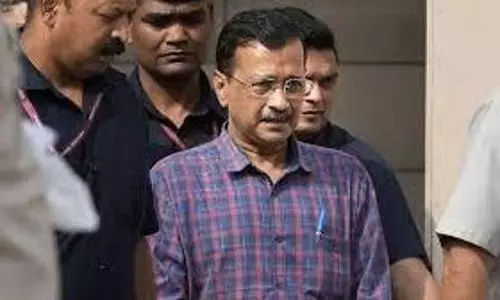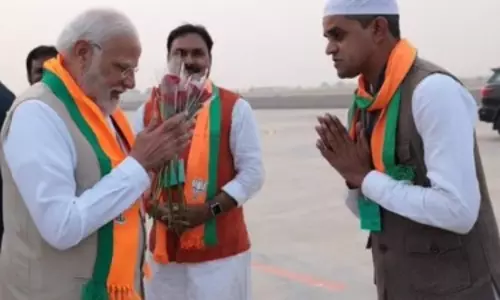
Stop the bragging, rectify the mistakes
text_fieldsIndia’s fast-growing economy has become crippled today; such observations have been surfacing frequently of late.
Even while those among the traders and laymen who were in misery post the note ban move said that the country faces a severe economic slowdown, the central government had denied all the claims. Not only the Reserve Bank and the Asian Development Bank but with even the ruling party and Finance Minister as well admitting the truth, the nation has woken up to the shocking realization that what was feared has become a reality. Not only is the economy in deep crisis but the apprehension that the situation might worsen also exist. The growth of GDP was much slower, spiraling down to 5.7 per cent when compared to the previous quarter. Growth in manufacturing and construction sectors has also fallen to 1.2 per cent compared to 4.5 per cent last year. Inflation has become more severe and the value of currency notes has come down. Cash crunch is acute while unemployment has escalated.
One of the observations is that India’s usually fragile economy, crumpled with the implementation of note ban and GST. At the same time, the erstwhile government has been blamed for this decline. Unfortunately, a political race is presently going on for putting the blames neglecting the ‘ailing’ nation. This blame games takes place not only between the government and the Opposition but also within the ruling party. The BJP had alleged Manmohan Singh to remain silent on demonetisation decision thereby landing the country into crisis. The Congress responded by saying that not going for the highly destructive note ban move was better than implementing it. Not only Raghuram Rajan, Manmohan Singh and S Gurumurthy, advisor to the Prime Minister but Subramanian Swamy as well who frantically wanted Raghuram Rajan to be sacked said that demonetisation caused a huge collateral damage. The allegations raised by BJP leader Yashwant Sinha, who served as the Finance Minister during the tenure of Vajpayee government, against the current Finance Minister Arun Jaitley are agreed by the majority of the ruling party itself even though covertly. Although Jayant Sinha, Union Minister and son of Yashwant Sinha, was fielded against him, the efforts seem futile. Already more than three years into power, they realize that the government cannot scoot off by laying blames on the Congress. Instead of openly admitting the fact, the government seems to have decided to come up with sheer claims through media campaigns. Even Arun Jaitley says that the present economic slowdown was temporary. He then attempted to personally insult Yashwant Sinha. Statements like ‘a job applicant at 80’ only reveals the mindset of the Finance Minister who has lost his confidence.
It’s the time for the Centre to approach the crisis with seriousness rather than the usual rhetoric and shortcut methods. For a nation that expected positive decisions to save the economy, in turn got to hear about new ‘project slogans’ like Saubhagya. When over 1.25 people seek employment every year, the crisis is such that even 3.5 lakh jobs cannot be created. Small and medium scale businesses and industries have been hit hard. Like Yashwant Sinha said, private investments have shrunk as never before in two decades. Industry and farming have declined. Not only the construction sector that provided the most number of jobs, but service and export sectors have also suffered a blow. The first and foremost step to follow in order to tackle the grave crisis is to acknowledge that crisis as well as its severity; is to openly admit the drawbacks in the policies and approaches. Secondly, the planning required to overcome the crisis should take place. At present, only the Prime Minister or a few take all the decisions. Even the Finance Minister seems to have come to know of the note ban decision after it was implemented. It’s also necessary to reclaim the organised systems of planning and consultations. Parliament is currently, in a defused state. Planning Commission was scrapped and replaced by NITI Aayog which ended up becoming a nominal committee. The recently formed five-member advisory council is likely to have the same fate. The autonomy and credibility of the Reserve Bank should be reclaimed. The grave drawbacks in policy formation and economic executions of the central government must be realized. The only way out is to admit the mistakes and rectify them.























